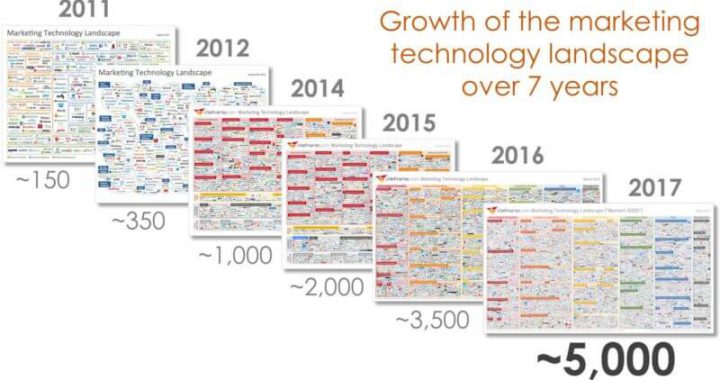Graphic Source: martechtoday.com
MarTech San Francisco 2017 just wrapped up and from what we're reading, the presentations and conversations were centered around the abundance of martech solutions and myriad of ways to configure a stack (aka M-architecture).
+5,000 MarTech Solutions and Counting
The marketing technology landscape has burgeoned by roughly 40% since 2016 to a total of 5,381 solutions, and of course a quantum leap since 2011 when only 150 or so solutions existed.
You can download an infographic of the 2017 MarTech Landscape at chiefmartec.com – while it doesn't rank the players, it just shows how overwhelmingly difficult identifying the right solution can be. Hence this has led to the growth of consultants out there offering services to manage martech rfps, whether for single solutions or stack creation.
Bespoke Stacking Rules
Reports from MarTech San Francisco also revealed that no two stacks – or marchitectures – are alike. The good news is marketing tech teams can customize their stacks, but like building an agency roster, we foresee challenges in determining the right stack mix.
Ideally, you want to build an efficient and highly scalable marketing to sales automation platform that accommodates multiple user types with a seamless and responsive user experience. And of course it should be accessible and simple to use.
When building the stack, consider the following:
- Solves – what needs are you trying solve, what are the priorities, and what belongs in the stack
- User Mix – who needs to access or leverage the enterprise stack or a particular component
- UX – like anything, if it's cumbersome or not meeting a user's unique needs, people will go around it
- KISS – keep it simply simple (no need for name calling!),
- Training – it should require minimal training across the user-types and be very intuitive
- Hire an Expert – there a lots of claims out there from solution providers to consultants, but vet your consultant and make sure they have a proven track record. And don't forget to check their references and case studies!

Buyer Beware
Lots of martech vendors claim to be platforms but not all are – a real platform is both capable of allowing other software to run on it and has a track record of third-party software solutions already utilizing the platform as its foundation. According to martechtoday.com contributor Sheldon Monteiro, slightly more than 1,000 of the martech providers have a true platform solution. The last thing you want is to have to build a lot of API's to integrate your software with your platform. It should be plug and play.
A Segment of One
Marketers have talked for years about establishing a 1:1 dialog with a customer and martech, when implemented properly, makes this possible. With all the noise out there vying for a consumer's attention, segmenting to a customer of one requires a simplified stack that delivers a unique message that is relevant to that customer's position within the purchase funnel. Building unique conversations tailored to each of your potential customers will break through your competitive messaging clutter. That's when they'll start talking about your product or service among their social community – and in a positive way if you've made a strong connection.
If you need daily coverage on the evolving world of marketing technology, we highly recommend signing up for MarTech Today. It's free and delivered right to your inbox. Visit martechtoday.com to subscribe.
Bajkowski + Partners LLC is a leading consultancy providing services to marketing and procurement teams in the areas of agency relationship management, agency search, process audits, contract and SOW development and audits, and a number of other marketing resource and marketing operations related areas. For more information, please visit our website.

